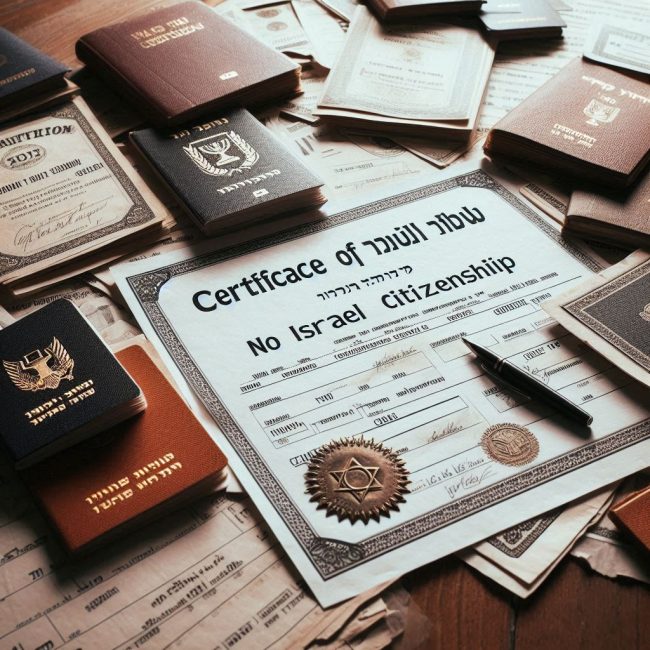Family Reunification in Israel
Family reunification in Israel is a complex and multifaceted issue, much more complicated than it may initially seem. Right from the outset, it is important to explain to readers that, aside from the unification of families of full-blooded and Halachic Jews, which is covered by the Law of Return (a topic we’ve previously addressed on our website), there are many other categories of non-Jewish relatives of Russian-speaking Israelis who are not Jews and do not formally have the right to claim Israeli citizenship under the aforementioned law.
This creates a need for family reunification for non-Jews in Israel through other means, requiring a meticulous study of directives and regulations that are not openly promoted by the Ministry of the Interior or other government bodies, as well as laws that are not easily accessible. Below, you’ll find a convenient navigation block that will allow you to select the topic you’re interested in before reading through our material on the subject of family reunification in Israel.
- Reunification with elderly single parents in Israel
- Law: “Granting status to elderly single parents in Israel”
- Husbands, wives, and same-sex spouses of Israeli citizens (STUPRO procedure)
- Status for parents of soldiers in Israel
- Children from previous marriages in Israel (STUPRO procedure)
- Inviting grandparents to Israel
- Israeli citizenship for minor children of non-Jewish spouses of Jews
- Israeli citizenship for widows or widowers of Jews
- Israeli citizenship for children born out of wedlock
- Humanitarian visa for Israel

For Jews, There Is Nothing More Important Than Family
We begin by noting that the family holds a central place in Jewish life and culture for a number of historical, religious, and social reasons.
In Jewish tradition, the family is viewed not just as a social structure but as a critical institution that links generations, upholds religious values, and preserves culture. This is primarily rooted in religion since, in the Torah and other sacred texts, the family is seen as the foundation of society. The first commandment in the Torah—“Be fruitful and multiply”—emphasizes the importance of creating and maintaining families.
Another key aspect is historical survival. Throughout centuries of persecution and exile, the family has been a crucial factor in preserving Jewish identity and traditions. The family is the main institution for passing on Jewish values, customs, and knowledge from one generation to the next.
In addition, in Jewish tradition, parents bear the primary responsibility for their children’s education, particularly in religious matters. Many Jewish holidays and rituals are centered around the family, strengthening family bonds and underscoring strong social ties. Respect for parents and care for elders are key ethical principles in Judaism.
There’s also a uniquely Jewish concept of “Tikkun Olam” (repairing the world), which implies that through family values, raising children, and caring for others, one can contribute to improving the world. The family is seen as a microcosm of society, where the education of a person capable of bettering the world begins through good deeds and observing commandments.
However, we believe that, beyond all of this, nothing is more important than the emotional support a family provides. This has tremendous significance for Jews, being one of their key values. The family is a source of emotional and psychological support through deep relationships between parents and children. This is especially important in the modern world, with its rapid pace, stress, anxieties, and constant external threats.
Emotional support within the family helps maintain harmony and mental balance, allowing individuals to cope with life’s challenges with far fewer losses. The deep spiritual connections in Jewish families form the foundation for the well-being not only of individuals but of society as a whole.
For this reason, the importance of the family is reflected in Jewish laws, customs, and social norms, influencing all aspects of life—from everyday practices to state policy. In Israel, the family is viewed not only as a private matter but as the cornerstone of public welfare and national survival.
Family Reunification as a Priority of Israeli Policy
Family reunification has been made a key element of Israel’s immigration policy for several important reasons:
- Jewish values: As mentioned earlier, family is of paramount importance in Judaism. The family reunification policy reflects these traditional values.
- Demographic considerations: Israel seeks to increase the Jewish population. Family reunification helps achieve this goal.
- Social cohesion: Complete families are considered more stable and better integrated into society.
- Historical legacy: Following the Holocaust and other historical events that split Jewish families, reunification became a vital goal.
- Support for new immigrants: Having family present helps new citizens adapt to life in Israel.
- Economic factors: Family support can reduce the burden on state social services.
- Humanitarian considerations: It aligns with humanitarian principles and international human rights norms.
- Strengthening the diaspora: This policy helps strengthen ties with Jewish communities worldwide.
- National security: Strong family ties are believed to contribute to greater loyalty to the state.
- Preservation of cultural heritage: Families play a key role in passing on Jewish culture and traditions to future generations.
We should clarify that this policy is not without controversy and is periodically reviewed in light of changing circumstances and the country’s needs. However, the primary goals remain unchanged.
Historical Overview: “How the Law of Return Policy Evolved”
The cornerstone of Israel’s immigration policy was laid with the adoption of the Law of Return in 1950, which grants every Jew, as well as their children and grandchildren, the right to repatriate to Israel and obtain citizenship. The law was passed shortly after the establishment of the State of Israel and reflects its mission to become a national home for Jews worldwide. It was designed to help Jews who suffered from anti-Semitism, persecution, and the Holocaust return to their historical homeland. The law also grants citizenship to Jewish spouses and family members.
Later, the 1952 Citizenship Law was enacted, regulating the acquisition, loss, and retention of Israeli citizenship. The main ways to obtain citizenship include repatriation under the Law of Return (for Jews), naturalization (for those legally residing in Israel and proficient in Hebrew), birth (if at least one parent is an Israeli citizen), and residence in Israel before the declaration of independence in 1948. The law also defines conditions for losing citizenship, including voluntary renunciation.
This legislative act underscores the high priority placed on preserving family integrity and granting family members living abroad the opportunity to immigrate, gain citizenship, or obtain residence permits. The law has been amended multiple times to account for various family immigration scenarios.
Key trends in the law’s changes include:
- A shift from a relatively open policy to a more restrictive one.
- Increased emphasis on security considerations.
- Balancing demographic goals with security concerns.
- Growing differences in policy for Jews and non-Jews.
In the early 2000s, a series of restrictions were introduced aimed at reducing well-known risks.
However, in recent years, the government has tried to strike a balance, addressing three main issues: improving demographics, continuing to support family reunification, and maximizing security. While it may seem from the outside that the laws have changed erratically over the past decades, and that the constant revision of rules often contradicted core policy directions, this is true. Today’s balance is delicate, reflecting the complex dynamics of the Israeli-Palestinian conflict, Israel’s demographic goals, and the ever-changing geopolitical realities of the region.

Some Statistics on Family Reunification
Unfortunately, precise and up-to-date statistics on family reunification in Israel are not always readily available or complete. However, we will attempt to provide an overview of the process and some figures to give an idea of the situation.
Statistics in numbers:
- Number of family reunification applications: The official statistics from Israel’s Ministry of the Interior show that the number of family reunification applications annually ranges from approximately 9,000 to 12,000.
- Applications from former USSR countries: Most family reunification requests with children who are Israeli citizens come from Ukraine, Russia, and Moldova.
- Processing time: Depending on factors such as the complexity of the case, the applicant’s origin, and the necessary documentation, the average processing time can range from several months to a year.
- General trend: Since the early 2000s, there has been a general decline in the number of approved family reunification applications. In recent years, refusals have become more frequent, with rejection rates reaching up to 63%.
- Permanent and temporary residency: As of 2024, more than 205,000 people may be granted temporary residency rights in Israel under the “Family Reunification Law.”
- Impact on demographics: Israel’s population is now close to 9.9 million, and it is expected to exceed 10 million by 2025.
- Legal Framework and Appeals: Israeli legislation is complex and presents a number of serious challenges in the process of family reunification. This situation results in a significant number of rejections and the need to submit appeals to contest the decisions made by the relevant authorities. Thousands of appeals are filed each year by relatives who encounter issues when trying to reunite with their family in Israel.
Use the navigation block below to select the topic of interest related to family reunification in Israel:
- Reunification with elderly single parents in Israel
- Law: “Granting status to elderly single parents in Israel”
- Husbands, wives, and same-sex spouses of Israeli citizens (STUPRO procedure)
- Status for parents of soldiers in Israel
- Children from previous marriages in Israel (STUPRO procedure)
- Inviting grandparents to Israel
- Israeli citizenship for minor children of non-Jewish spouses of Jews
- Israeli citizenship for widows or widowers of Jews
- Israeli citizenship for children born out of wedlock
- Humanitarian visa for Israel





